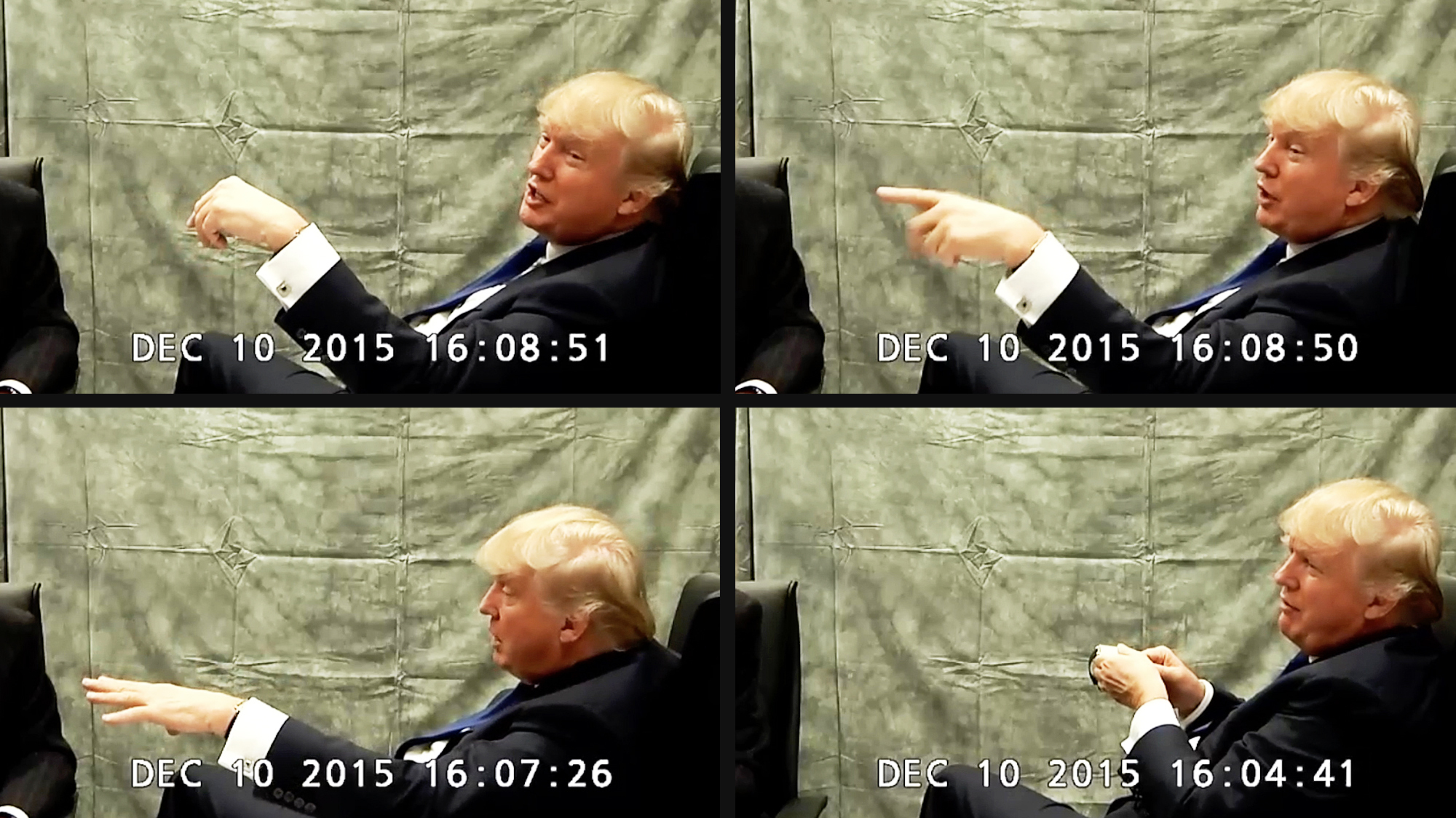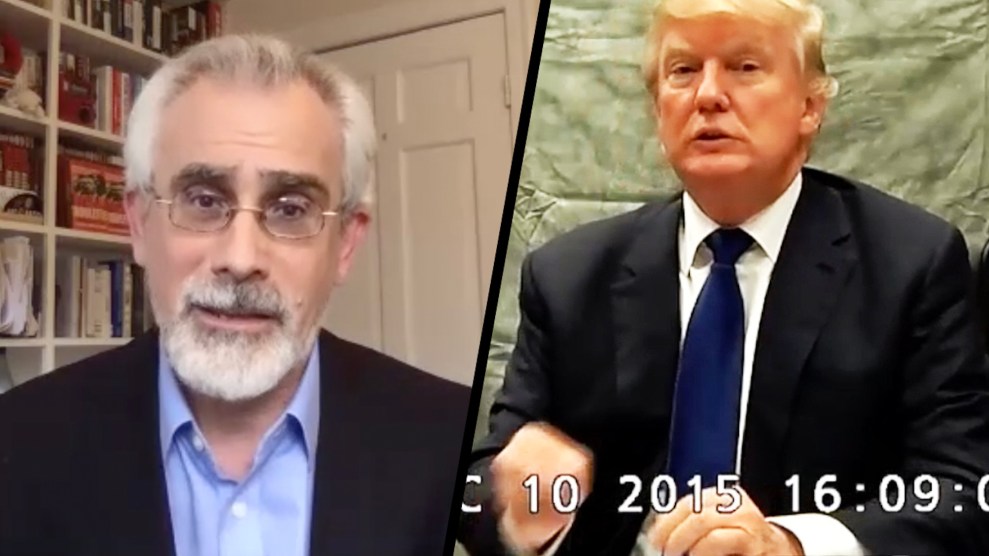On December 10, 2015, Donald Trump took time off from campaigning for the Republican presidential nomination to spend hours sitting for a videotaped deposition in a lawsuit alleging that he and Trump University had defrauded people who had plunked down thousands of dollars to learn the secrets of his financial success as a developer. During a break in the proceedings, the camera continued to roll. And Trump and his attorney, Daniel Petrocelli, apparently unaware they were being recorded, were captured discussing the case.
In this 13-minute hot-mic video—a copy of which was provided to Mother Jones—Trump boasted about how his company threatened the Better Business Bureau to change the D rating it had assigned Trump University to an A. He complained about the federal judge overseeing the suit, Gonzalo Curiel, elliptically talking about how to challenge him and referring to “the Spanish thing.” Trump also griped that he had been sued personally in this case, and Petrocelli had to explain to Trump that he, not just Trump University itself, was in the legal crosshairs because Trump had been accused of making false statements to promote the venture. And Petrocelli pointed out that the case was not a lock for Trump because some of Trump’s “guys” had been “sloppy.”
This tape shows Trump in the wild, trying to figure out how to contend with a judge who he believed was not on his side (perhaps with the use of a racist attack), bragging about pressuring a group that had given his business a low rating, and grousing that he was being held personally responsible for a Trump enterprise accused of scamming people.
During the 2016 campaign, Trump had to contend with three lawsuits accusing him and Trump University—which was not an accredited as a university—of hoodwinking students who had paid between $1,495 and $34,995 for real estate seminars. Trump, who had personally promoted this endeavor and vouched for the instructors (“handpicked by me”), vowed that he would never settle the cases, and he succeeded in pushing the trial until after Election Day. Shortly after the election, Trump settled the lawsuits, agreeing to pay $25 million without admitting wrongdoing.
The entire 2015 deposition was videotaped, and Curiel granted Trump’s request to seal the videotape of the deposition; only a written transcript was made public. Trump and Petrocelli seemingly did not realize that a camera was still on while they talked during this break in the question-and-answer session.
Art Cohen, the lead plaintiff in one of two Trump University class-action lawsuits, gave a copy of this recording to Mother Jones. “I wanted to get this out before the election so people better understand how Trump behaves behind the scenes,” Cohen says. “Staying quiet all this time has been frustrating for me, and I wish everybody had gotten the chance to see Trump’s behavior as I did before the 2016 election. With 20/20 vision, we now have the opportunity to better understand his true nature and the gangster persona he shows in this video.” Cohen maintains that Trump’s ability to avoid a trial during the campaign cleared a major political obstacle for him, and he adds, “The Trump University legal saga is a footnote to history, but it helped Trump hone his blueprint for attacking the judiciary by publicly berating judges he deems adversarial.”
Mother Jones sent Petrocelli a list of questions about the conversation, which took place with several other people in the room. In response, Martin Checov, the general counsel of O’Melveny & Myers—the law firm where Petrocelli practices—sent a letter to Mother Jones, “on behalf of Trump University and President Donald J. Trump,” demanding that Mother Jones “not publish the video or any article relating to it and immediately destroy the video.”
The Trump-Petrocelli discussion came after close to six hours of questioning in a Trump Tower conference room that often generated contentious back-and-forth. In the late afternoon, Jason Forge, an attorney for Cohen and other plaintiffs, asked Trump if he had any “personal knowledge as to whether the instructors for these [Trump University] seminars had any experience buying or selling real estate.” Trump said he believed they did. When Forge pressed for a clearer answer, Trump said, “All I can say is it was too long ago.” Forge continued to push on this point, asking Trump if he had ever said “good things” about people “even though those things weren’t true.” Petrocelli instructed Trump not to answer. And Trump, according to the written transcript, taunted Forge, saying, “Am I frustrating you?…Don’t get frustrated.” The session became heated. Forge demanded that Petrocelli stop waving his finger at him. Petrocelli called Forge “an amateur” and demanded that people in the room “stop snickering.” Forge wondered aloud if Petrocelli’s blood sugar was low and said to him, “You’re out of control right now.” Petrocelli ordered Trump to remove the microphone, and a short break ensued.
After the timeout, Petrocelli and Trump returned to the room and took their places at the conference table for what would be the last hour of the deposition. And for more than 10 minutes, while they waited for the plaintiffs’ legal team to return, their conversation was recorded. Trump complained that he was being sued “personally” in this case. “There is a reason for a corporation,” he told Petrocelli. Trump added, “You know I’ve got hundreds of cases and I never get sued. I don’t even get sued.” Petrocelli responded, “Because they are saying you are personally involved in making false, in making false statements.”
Trump then turned to the subject of Curiel and asked Petrocelli, “Is he an asshole or does he just want me in his courtroom?” The lawyer answered, “Latter,” and said, “He’s an average judge. He’s not nuts. He’s from the wrong side of the aisle, too. That’s not helping.” Trump replied, “What about the Spanish thing?” It’s not clear what Trump was referring to. But months later, Trump publicly attacked Curiel, calling him “a hater of Donald Trump” and saying Curiel “happens to be, we believe, Mexican.” Trump claimed that because he proposed building a wall on the US–Mexico border, Curiel was biased against him. (Curiel was born in Indiana.)
Continuing to discuss Curiel with Petrocelli, Trump referred to an earlier judge involved in the Trump University cases whom he seemed more fond of, adding, “Then I got this guy. Nothing!”
Trump asked Petrocelli to assess the odds of winning the case. “If we had to try this case I think we would win this case,” Petrocelli said. “I think you’re a big reason why, because the jurors like you.” Trump interrupted, “You think it’s an easy one?” The lawyer answered, “Um, honestly, no…I put it at like about 50 percent.”
A few minutes later, after complaining that the plaintiffs’ lawyers had not yet returned, Trump asked Petrocelli, “How’s our Barrack man doing?”—apparently referring to his friend and ally Tom Barrack, a private equity mogul and Trump fundraiser. “He’s got a new bride, couple new kids,” Petrocelli said. Trump asked, “What’s that all about? When did he get married?” Petrocelli answered, “Got married about a year ago.” Trump quickly shot back: “Is she beautiful?” And Petrocelli responded, “Yeah, young. She’s 38, 37.” Trump enquired, “How old is he, 65?” Barrack was then 68. “He gets a kick out of this,” Trump continued. “Can you believe this? Sitting here with this bullshit?” Petrocelli responded, “With everything on your mind, I don’t know how you’re doing this. I really feel bad for you.”
Trump then returned to Petrocelli’s chances of winning the case, asking the lawyer if he would ever tell a client the odds were better than 50 percent. Petrocelli answered, “You never go above 70 percent in a case.” Trump asked, “Even if it’s a lock?”
There’s always an “X-Factor,” the attorney explained. Trump replied, “You mean, if you think you got a lock, you’re not going to tell the client?” Petrocelli said he had “never gone above 75 percent.” That prompted Trump to tell Petrocelli how he discussed his own chances in the presidential race: “‘What are your chances of getting the nomination?’ I said 50. Even though I’m at 40. You understand?…I don’t want to say, ‘Oh, I’m going to get it.'” He once again asked Petrocelli to rate the Trump University case. Petrocelli replied, “I would rate this above average, but I have had stronger cases…I think the guys under you sort of let you down—a little sloppy.”
Trump said he was optimistic about the case. “Can I tell you something? Everybody that’s involved in this a little bit, they are so professional. Honestly, [unintelligible]. The other thing is, big charts and the books and the whole thing. They walk out with a whole pile of stuff. I think you’ll be okay. I think better than 50 percent.”
Trump brought up Trump University’s run-in with the Better Business Bureau, a private nonprofit organization that reviews businesses and charities and rates them, using a scale of A to F. Shaking his head, he told Petrocelli that the bureau “gave it a D…a D. You know what that is? That’s a kill for you.” But then, Trump noted, someone called the Better Business Bureau and said, “We’re going to sue you. [Unintelligible.] An A, got the D removed.” Explaining this episode, he referred to “my guy upstairs” and described him as “an Alan Garten type, he’s tough”—referring to the Trump Organization’s top lawyer. Petrocelli asked, “Works for you upstairs?” “Yeah,” Trump said.
Trump’s troubles with the Better Business Bureau would become a campaign issue three months later. During a Republican presidential debate, Megyn Kelly, then a Fox News host, asked Trump about the Trump University’s D- rating. Trump insisted, “Right now it is an A.” (Trump University had shut down in 2010.) During a commercial break, Trump claimed to Fox journalists that the Better Business Bureau had just sent a message affirming the A rating. But several days later, the BBB said it had not sent any document to the Republican debate. It noted that Trump University “does not currently have an A rating” and had a “No Rating” since 2015. “Prior to that, it fluctuated between D- and A+,” the bureau said.
The BBB’s statement explained the history of Trump University’s rating: “During the period when Trump University appeared to be active in the marketplace, BBB received multiple customer complaints about this business. These complaints affected the Trump University BBB rating, which was as low as D- in 2010.” The bureau noted that after Trump University closed there were no new complaints and that complaints older than three years “automatically rolled off” and “Trump University’s BBB rating went to an A in July 2014 and then to an A+ in January 2015.” That is, according to the BBB, Trump’s business got A ratings years after it had closed.
The Better Business Bureau did not respond to a request for comment regarding whether anyone connected to Trump or Trump University threatened to sue the bureau over the D rating and successfully pressured it to change the rating to an A.
Trump’s conversation with Petrocelli about the Better Business Bureau grade was cut short, as the deposition resumed. Petrocelli complained that Forge had kept them waiting. Forge replied that Petrocelli and Trump had shown up half an hour late, following the earlier lunch break. “Eating your free lunch we provided you,” Petrocelli snapped. “I didn’t eat it,” Forge said.
“You didn’t eat?” Trump asked. “Let’s go,” Petrocelli said. “Next time we’ll get you some vegetables.”
Here’s the full hot-mic video:
















